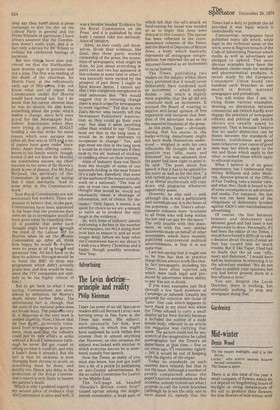Advertising
The Levin doctrine— principle and reality
Philip Kleinman
Taper (as some of us old Spectator readers still call Bernard Levin) was burning away in fine form in the Times last week. His subject, most, unusually for him, was advertising, in which you might have supposed he took rather less interest than in almost anything else. However, on this occasion the subject was linked with another in which everyone knows he is interested, namely free speech.
Now the Times, as many of you must also know, has just got itself into a bit of a pickle by publishing an anti-Zionist advertisement by the so-called Committee for Justice in the Kiddie East. The full-page ad, headed 'Shouldn't Britain come first?' caused uproar among the AngloJewish community, a large part of which felt that the ad's attack on fund-raising for Israel was worded so as to imply that Jews were disloyal to this country. The uproar has been reflected in the correspondence columns of the Times, and the Board of Deputies of British Jews, a body which basically represents all synagogue congregations, has reported the ad to the Attorney-General as an incitement to racial hatred.
The Times, publishing two leaders on the subject within three days, protested that it would never deliberately have condoned such an incitement which nobody doubts and, which is slightly more arguable, that the ad did not constitute such an incitement. It accused the Board of wanting to deprive anti-Israel opinion of free expression and declared that freedom of the advertiser was one of the essential freedoms of the press.
At this point, Taper obviously fearing that his mates in the leader-writing department might not have made themselves understood weighed in with his own reflections. He thought the ad in question was "silly, nasty and dishonest" but was adamant that the paper had been right to print it. He said: "The point about free speech is that it has to be upheld for the nasty as well as for the nice," a well-turned phrase which I hope all of us liberal intellectuals will copy down and plagiarise whenever opportunity arises.
However, he also said and, although this is not a particularly well-turned phrase, it is the heart of the argument the Times's advertisement columns were "available to all those who will keep within the law and can pay for the space." The only trouble with this statement, as with the very similar statements made on behalf of other newspapers which have recently published controversial political advertisements, is that it is not quite true.
I am not saying that it ought not to be true but that in practice things do not always work like that. In fact newspapers, including the Times, have often rejected ads which were both legal and produced by advertisers whose ability to pay was not in doubt.
If you want examples just flick through a few back numbers of Campaign or Adweek. Usually the grounds for rejection are those of taste.' One case which happens to have stuck in my mind was when the Times refused to carry a small display ad for New Society because it included the outline of a nude female body, relevant to an article the magazine was carrying that week. The picture could not by any stretch of the imagination be called pornographic but the Times's ad department at that time five or six years ago, in remember rightly felt it wOuld be out of keeping with the dignity of the organ. Today its standards on such matters have relaxed, but that is not the issue. Although a number of people complained about the paper's narrow-mindedness on that occasion, nobody trotted out what I propose to call the Levin Doctrine (although he is not the only one to have stated it), namely that the Times had a duty to publish the ad provided it was legal, which it undoubtedly was.
Contrariwise, newspapers have published many ads which, while legal in the technical sense of the word, were in flagrant breach of the Code of Advertising Practice which media as well as advertisers are pledged to uphold. • The most obvious examples have been the dishonest claims made for medical and pharmaceutical products. A recent study by the European Consumers' Union found two hundred such breaches in one month in British national newspapers and periodicals.
You will notice that I am, in citing these various examples, drawing no distinction between commercial ads (which hardly ever engage the attention of newspaper editors) and political ads (which editors are usually asked to approve). That is because I believe that no useful distinction can be drawn between the standards of honesty, truthfulness and good taste (whatever your canon of good taste may be) which apply to the one and those which apply to the other, or indeed those which apply to editorial matter.
What I believe is of no great importance, but I understand that Shirley Williams and John Methyen, director-general of the Office of Fair Trading, take a similar view, and what they think is bound to be of some consequence to advertisers and media. For instance, the last has not yet been heard of the allegations of dishonesty levelled against GKN's anti-nationalisation advertising.
Of course, the line between honesty and dishonesty and between good and bad taste is not always easy to draw. Personally, if I had been the editor of the Times, I would have found it difficult to take a decision about the anti-Zionist ad that has caused him so much trouble. But if, like Taper, I had had no doubt that the ad was "silly, nasty and dishonest," I would have had no hesitation in returning it to the Advertiser marked "We do not refuse to publish your opinions, but you had better present them in a less offensive form."
You see, despite the Levin Doctrine, there is nothing, but absolutely nothing, to stop any newspaper doing that.














































 Previous page
Previous page